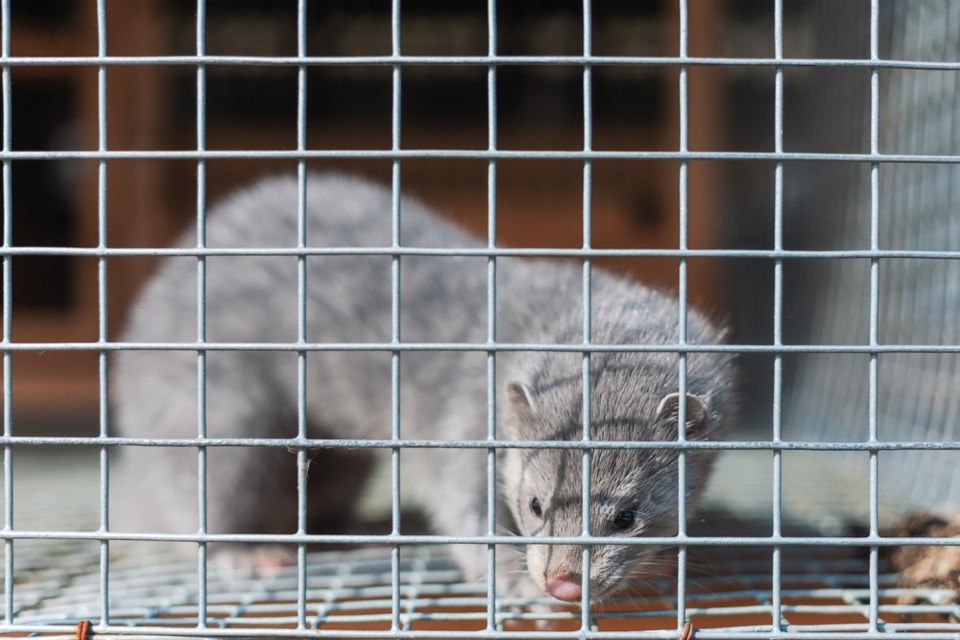A sa国际传媒 Supreme Court judge has thrown out five mink farm lawsuits that claimed the provincial government was attempting to shut down their fur industry under the guise of COVID protections.
“I have determined that the notices of civil claim advance claims that are bound to fail, and which cannot be redeemed by amending the pleadings,” Justice Amy Francis said in a May 7 decision. “Therefore, the five notices of civil claim must be struck in their entirety.”
Part of the judge’s reasoning was in response to a claim that the government was acting politically in bowing to lobbyists’ demands to curtail the fur industry.
However, Francis said, acting for political reasons rather than health reasons was not an unlawful act.
“Nor can it support a finding of bad faith or conduct inconsistent with the obligations of office,” the judge ruled.
She called the assertions the government acted in bad faith “pure speculation.”
“I conclude that the plaintiffs have failed to plead facts capable of establishing that any of the defendants acted unlawfully,” Francis said.
The farms and the province
The farms filed lawsuits in B.C Supreme Court alleging the province’s pandemic orders aimed at the industry to prevent COVID-19's spread, and the 2021 decision to ban the industry were unlawful and caused economic damages.
In notices of civil claim filed in 2023, Bargatze Mink Ranch, C&A Mink Ranch, Engebretson Fur Farm and Dogwood Fur Farm named the Ministry of Agriculture and Food, provincial health officer Dr. Bonnie Henry and sa国际传媒 chief veterinarian Rayna Gunvaldsen.
“They knew that the decision was not related to animal health or public health as required under the legislative scheme, but rather that it was for political, social and public opinion or an otherwise improper purpose not related to the legislative scheme,” said the almost-identical claims.
The farmers said the government continued to meet with them through 2021 in meetings they believed were to find a way forward with issues facing the industry.
The lawsuits said it was “without warning and without consulting with mink fur farmers” that, on Nov. 5, 2021, Ministry of Agriculture and Ministry of Health officials, deputy provincial health officer Dr. Brian Emmerson, and Fraser Health Medical Officer Dr. Emily Newhouse announced the province’s decision to ban mink farming effective Nov. 26, 2021, with all activities to cease April 1, 2025. That was done with an order in council (OIC).
The sa国际传媒 ban cited “ongoing persistence of infected mink and workers at mink farms contracting SARS-CoV-2 from mink and transmitting on to broader human populations.”
It said the situation was a risk to public health.
The judge noted farmed mink are susceptible to respiratory viruses, including SARS-CoV-2, the virus that causes COVID-19.
“Due to some highly publicized incidences of COVID-19 on mink farms, the provincial health officer made an order in July 2021 requiring mink farmers to take various measures to prevent the spread of the virus,” Francis said. "That provincial health order was not challenged in this lawsuit, although it does form part of the factual matrix that animates the claims made against the defendants."
However, the claims asserted, they believed that officials representing the province would work cooperatively with mink farmers to address the risks associated with SARS-CoV-2 in farmed mink.
“Then, without warning, the OIC was enacted, banning mink farming,” the judge said.
The suits claimed the ban caused economic and business losses, costs in winding down businesses and emotional pain and suffering.
Malfeasance in public office
The judge said there are two types of misfeasance in public office. One involves conduct that is specifically intended to injure a person or a class of persons while the other involves a public officer who acts with knowledge both that she or he has no power to do the act complained of and that the act is likely to injure the plaintiff.
The mink farmers claimed the second form was in play in their case. They had claimed the government was bowing to lobby groups seeking a shutdown of the fur industry.
“They submit that the true motivation for the OIC is the pressure imposed on the province by various lobbying groups and public opinion, that in doing so, the government acted outside of its legislative powers."
Francis said the problem with that argument was that, “it fails to appreciate the legislative scheme under which the OIC was enacted; and it presumes that there is something unlawful about passing subordinate legislation for political reasons.”
Glacier Media has reached out to the farms' lawyer, Melanie Power, to see if the plaintiffs intend to appeal the decision.

